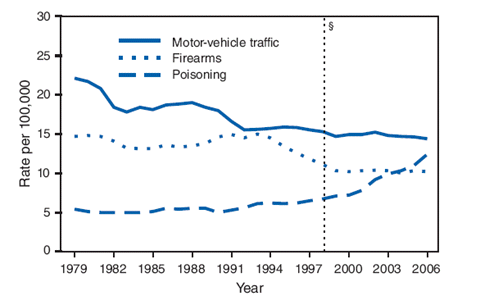
A loyal reader recently sent us the above graph, culled from a recent issue of Morbidity and Mortality Weekly Report. The accompanying text only explains what’s obvious to even the untrained eye: as the age-adjusted death rates linked to firearms and motor-vehicle accidents have declined, poison has become an increasingly efficient killer of Americans.
Does this mean our nation’s children are becoming more proficient at opening kitchen cabinets and getting at the cleaning supplies? Not at all—the Centers for Disease Control includes prescription drug overdoses among its poisoning statistics. And those overdoses constitute the vast majority of today’s cases of death-by-poison:
More than 23,000 unintentional poisoning deaths occurred in the United States in 2005. Almost all of them were due to drugs.
(Our bolding.) While about half of calls to poison-control centers involve concerns over children’s ingestion of chemicals, such incidents lead to relatively few fatalities—in part, of course, because the centers help the most severely affected victims obtain critical medical assistance. But adults who’ve taken too many pills? They’re less likely to call, perhaps because of their impaired judgment. And so, unlike with injuries due to firearms or traffic accidents, many poisoning victims never receive care until it’s too late.
The more important story here, however, is our increasing reliance on prescription drugs. Check out the stats here (PDF); the percent of Americans taking at least one medication per month increased by 19.4 percent between 1988 and 2004. And the number of heavy users—that is, people taking three or more prescriptions per month—nearly doubled over that same time span. Small wonder, then, that overdoses have increased—even the most beneficial medicines can do grave harm if taken in large quantities. Which is probably a good reason for physicians to be a wee bit more cautious when doling out the pills—something that’s unlikely to happen in our current FUBAR health-care system, in which writing scripts is often the quickest, cheapest way to dispense with bothersome patients.


Like gas stations in rural Texas after 10 pm, comments are closed.